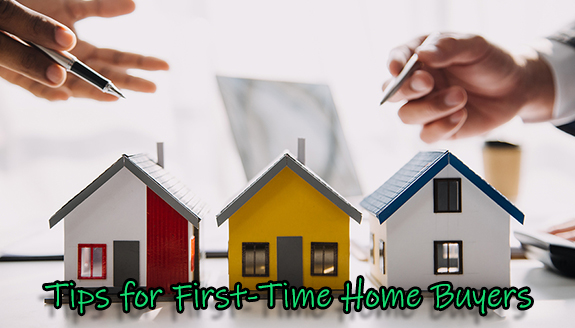Before getting your first home, there are certain things that you need to consider first. A few pointers on home buying can come in handy and help avoid mistakes that can be quite costly. This is why we’ve assembled some tips for first-time home buyers to make sure that you have a seamless home-buying experience.

First-time homeowners must look out for certain things before they close the deal on the house. One crucial thing they must have is an excellent credit score because this will determine if they will be eligible for a mortgage that can be used to purchase the house. For more tips on home buying, check out the next segment below.
Tips for First-Time Home Buyers
First-time home buyers need to know a few tips before they get their new home that will help them avoid certain mistakes that will turn out to cost thousands of dollars. Here are 15 tips that can guide you when you want to buy a house for the first time:
1. Ensure That You Are Ready For Homeownership
Most people who are looking into getting a house for the first time have an understanding of the financial investment that it takes to own a home. However, there are a few complications that might arise. So before you get home, you need to ask yourself certain questions, such as:
- Are you ready for the cost of home repairs? When your roof leaks during the rainy season, you need to pay for the repairs out of your pocket.
- Do you have a home maintenance expense buffer? It has been recommended by realtors that homeowners set aside 1% of their home’s value to cover unexpected repairs and other maintenance.
- Do you have a maximum housing expense budget? You need to set a mortgage payment aside to work around your budget.
2. Know Your Credit Score
Credit scores are one important criterion for getting a home mortgage. Several lenders will check the maximum debt-to-income ratio of 43 percent and whether you pay your bills on time. You need to check your credit score two months before you apply for a mortgage.
If you have an excellent credit score, then you are set to get a home mortgage. However, if your case is otherwise, you might want to consider working on your credit score before applying for a home mortgage.
3. Analyze Your Spending Habits
Before getting a new home, you need to have an estimate of how much you will spend per month. With this calculation, you can check if you will be able to pay for your monthly premiums.
You should reassess spending on certain things, such as utilities, rent, car maintenance, student and personal debts, food, childcare, entertainment, clothing, and others. If you spend excessively, it might be time to cut down on your spending.
4. Search for First-Time Homebuyer Down Payment Assistance
This is one of the most important tips for first-time home buyers. Depending on your income and the location of the home you want to purchase, you may qualify for down payment assistance. Most states and local governments offer housing programs that cover both your down payment and closing costs.
Many of these programs have a strict income limit, and they might require that you live in the home for a specific amount of time to avoid paying the assistance back.
5. Know Your Mortgage Options
For you to get a quick approval, you need to know the right mortgage to apply for. Several government agencies provide loan programs for borrowers with bad credit scores, low-income buyers searching for homes in rural areas and military borrowers.
First-time home buyers can also go for conventional loans. However, they come with stern qualifying requirements.
6. Get Your Paperwork Ready
Many lenders today offer online loan applications, and you need to provide certain documents before you can be approved for the mortgage. To get pre-approved for the loan, you will need documents such as the last two years of W-2s, the current month’s worth of paystubs, and two months of recent bank statements.
7. Look Around for A Mortgage Lender
Research has shown that borrowers who shop around for mortgages have saved a total of $63,000 on average over their loans. You can reach out to your mortgage brokers and mortgage banks to see what options they have for you.
It would be advisable to gather your quote on the same day, ask around for a rate-lock option, and then ask about the available DPA programs.
8. Get Your Approval Letter
After choosing a lender, the next step is to get a pre-approval letter. The letter will provide information about the type of loan that you are eligible for, which includes the amount of the loan, interest rate, and maximum PITI payment.
If you don’t let the lender know what your payment budget is ahead of time, likely, the preapproval letter will only reflect the maximum you qualify for depending on your loan application.
9. Know the Type of Home You Need
There are lots of options when it comes to buying a home, and they include a cooperative, a traditional single-family home, a condo, a duplex, and a multifamily building with 2–6 units. Based on the goals of your home, each of these home options has its merits and demerits. Most importantly, the price varies. Thus, you need to know what you want and how much you can afford.
10. Choose the Right Realtor for You
A real estate agent must help you find a home that suits your needs at the best price possible. A professional real estate agent has good communication skills and has the expertise and personal touch to set realistic expectations depending on the local housing market.
You can also ask your relatives and co-workers for recommendations and interview at least three agents to check if your personalities match.
11. Lock in Your Interest Rate
As soon as your home is under contract, the next thing to do is lock in your interest rate if you haven’t already. This is very important if the mortgage rates are high. Ensure that you understand the terms and conditions of the lock.
12. Inspect the Home
This is one of the most important parts of getting a home. Even if you are buying a fixer-upper house, you still need to inspect the house from top to bottom to check if it is in good condition. There are loans that you can take out if the house is not in good shape.
These loans enable homeowners to roll over the cost of repairs and renovations into a single loan to purchase the home.
13. Negotiate With the Seller
There are several ways that you can negotiate with the seller to get the best terms for your home purchase. You can always ask for a closing cost credit in place of repairs.
Based on the type of loan that you apply for, you may be able to get the seller to pay almost 6% of your sales price that goes towards closing costs. If there are major problems with the house, it would be worthwhile to ask the seller to pay a portion of the cost of repairs.
Another way to negotiate with the seller is to ask for a lower price. If the seller won’t agree to pay the closing costs, you can ask for a reduction in the sale price.
14. Shop Around for Homeowners Insurance
If you have a mortgage, you will be required to get homeowners insurance. The lower your premium, the lower your total monthly mortgage payment is going to be. You can shop around for homeowners insurance and compare the quotes from different companies. You can also consider adding your car insurance and homeowners insurance together to get a discount.
15. Be Aware Of the Closing Cost
After you are satisfied with all the terms and conditions of your loan, you will receive a closing disclosure. This will be sent to you three working days before the store closes. You can check it to make sure that the rates and costs are accurate and that you are credited for any cost that the seller agrees to.
Your realtor will schedule a walkthrough to ensure that your home is ready for you to move in and that you are ready to sign your closing papers. As soon as the lender funds your mortgage, the title is transferred into your registered name, and you will become an official homeowner.
